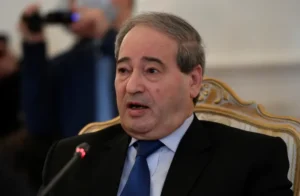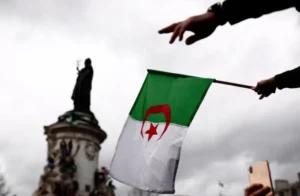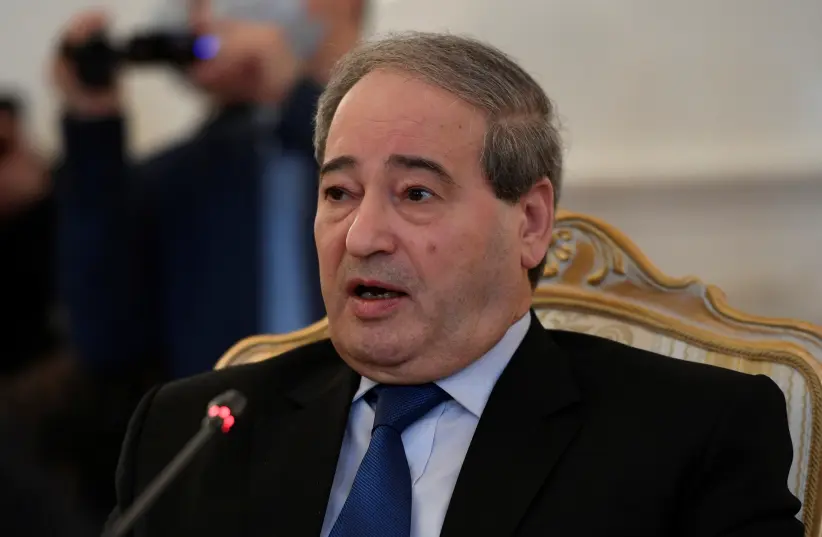The important event will include a large military parade and has important implications for the region.

The pro-Iranian and pro-Syria regime Al-Mayadeen media say that Algeria will host Syria’s Foreign Minister Faisal Mekdad. He recently held important talks with his Iranian counterpart Hossein Amir-Abdollahian in Damascus on July 2. They discussed Turkey’s recent threats to launch a new operation in Syria.
Now Syria wants to do more outreach to Algeria, which is celebrating its 60th anniversary of independence. Al-Mayadeen also said Hamas will send senior political leader Ismail Haniyeh to the events. The Palestinian WAFA news agency also said that “President Mahmoud Abbas is set to attend the commemorative festivities of the 60th anniversary of Algeria’s independence.”
Mekdad is supposed to arrive in Algiers today on a three-day visit, during which he will meet with senior Algerian officials, the report says. This is important because Syria has been relatively isolated over the last decade during the civil war, so it is now doing outreach to Egypt as well as the Gulf. Syria’s regime relies on Russia and Iran. However, the Russian invasion of Ukraine could weaken Moscow’s hand in Syria – and Iran could benefit. Tehran threatens Israel from Syria and also threatens US forces.
According to the reports, the visit by Mekdad is the first since he became foreign minister. It’s possible that Syria will want to participate in an Arab League summit of Arab states in Algeria in the fall as well.
Ramtane Lamamra, an Algerian diplomat who is minister of foreign affairs, was quoted as saying that “we as an Arab country have known our position for a long time – that we did not support suspending Syria’s membership in the Arab League because Syria is a founding member of the league. As for our position as a host country, this is of course linked to consultations, because the goal is consensus in all decisions, big or small, but Syria is definitely at the center of our concerns.”
“As for our position as a host country, this is of course linked to consultations, because the goal is consensus in all decisions, big or small, but Syria is definitely at the center of our concerns.”
Ramtane Lamamra

Secretary-General of the Arab League Ahmed Aboul Gheit had discussed Syria’s return to the league in March of this year, and said the foreign ministers did not discuss the issue, “adding that it would be left for bilateral talks between the Arab countries, and if there is an agreement on the matter, Syria will return to the organization,” according to Asharq al-Awsat.
An important year for Algeria
THIS YEAR is important for Algeria. The country won its independence in a long conflict that culminated in March 1962 in the Evian Accords and a vote by Algerians for independence, ending more than 100 years during which France had occupied the country. The July 5 vote is what is being commemorated. “The country’s authorities are planning to mark the anniversary with pomp and ceremony, capped by a vast military parade in Algiers, the first of its kind in 33 years,” according to France 24.
When Algeria received independence, it was an inspiration to other movements in the region and globally. The Algerian experience also has cast a shadow over the Israel-Palestinian conflict. An article at TRT last year noted how Algiers has always opposed normalization with Jerusalem, despite the era of the Abraham Accords.
“We must consider Algeria’s bloody war of independence (1954-1962). This experience of fighting against French colonial rule retains a special status not only in the Algerian psyche, but also in the collective conscience throughout Arab/Muslim countries. It is tough to exaggerate how much this chapter of the North African country’s history shapes Algerian identity and perspectives on the Palestinian cause,” the article notes.
“Algerians believe that they serve as a model for people in the Global South who struggle against colonialism and imperialism,” it said. “As The International Interest’s Sami Hamdi put it, ‘Algerians feel a deep resonance with the Palestinians who have been colonized for some 82 years and believe that whatever the difficulties, resistance will eventually succeed.’” Algeria has backed the Palestinians and this is important because it ties into Syria’s claims to be part of the “resistance” against Israel.
According to Al-Mayadeen, Hamas will also attend the 60th-anniversary event. “Our Palestinian people and their valiant resistance look to the Algerian revolution as an inspiration from which we derive an example on our path towards the liberation of Palestine in its entirety, from the river to the sea,” the article quotes Hamas as saying. Hamas reportedly said that it hoped Algeria will “always be supportive of the Palestinian people, and reject all forms of cooperation and normalization with the occupation.”
ALGERIA HAS a large and important army and close ties with Russia. An article at Russia’s TASS media noted that “Algeria is confident that its military-technical cooperation with Russia will continue, the country’s Ambassador to Russia Smail Benamara told reporters on Friday on the sideline of a conference in Kazan.” The article noted that Benamara said: “Relations [in the military-technical area] are long-standing and run deep,” he said in response to a question from TASS. “It’s not just about weapons purchases, but also exercises, cooperation, data exchange. Of course, this will continue.”
Algeria matters because of its key position in North Africa. Libya, for instance, is still suffering civil conflict. Tunisia is in the midst of a potential constitutional crisis as its leadership proposes a more authoritarian model, potentially drifting away from the Arab Spring success story. Morocco and Algeria are also having tensions, not only over a recent migration disaster in Melilla, but also over the disputed Western Sahara area. Algeria supports a self-determination referendum for the disputed area.
This matters for Spain as well. France 24 reported earlier this month that “Algeria said it was suspending a decades-old cooperation treaty with Spain, after Madrid backed the position of the North African country’s arch-rival Morocco on the disputed Western Sahara.” The report noted that “Algeria has decided to immediately suspend the treaty of friendship, good neighborliness and co-operation,” the Algerian presidency said in a statement.
“Madrid and Algiers had signed the deal in 2002 to promote dialogue and cooperation on political, economic, financial, education and defence issues,” the report said. Morocco’s embassy in Spain has blamed Algeria for enabling violent migrants to enter Morocco, leading to migration tensions and recent deaths of migrants at Melilla.
MOROCCO AND Israel have new and emerging ties. This is important for the Abraham Accords. The Trump administration’s decision to recognize Western Sahara as part of Morocco ruffled feathers in the US Congress – and some have called for the recognition to be reversed by the Biden administration. The recognition of Morocco’s sovereignty came as Jerusalem and Rabat established diplomatic ties. Thus, Algeria and its importance in the region are linked to a number of issues, from Morocco to Spain, Syria and the Palestinians.
WAFA media also noted that according to “Palestine’s Ambassador to Algeria, Fayez Abu Eita… President Abbas will participate in the festivities at the invitation of his Algerian counterpart, Abdelmadjid Tebboune, which shows the depth and the extent of the historical, bilateral Palestinian-Algerian relations as well as the interest of both leaderships in consolidating them.”
The size of the military parade and who attends it are important for Algeria, with ramifications for the Sahel and North Africa, as well as for Mauritania, Mali and Niger. The suspension of trade agreements with Spain is of great importance – as is Russia’s role in Algeria and the Sahel.

